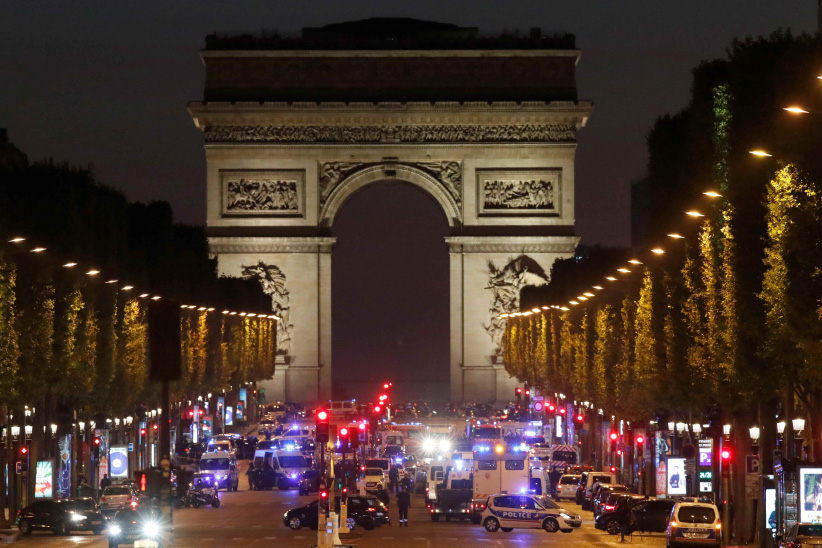Terrorism and the new normal in Paris
Leah McLaren on the latest terror attack, and what it means in advance of France’s presidential election
Police secure the Champs Elysees Avenue after one policeman was killed and another wounded in a shooting incident in Paris, France, April 20, 2017. (Christian Hartmann/Reuters)
Share

The landscape of Paris, so instantly familiar for its swirl of patisseries, Beaux-Arts architecture and well-dressed French urbanites, has been indelibly altered by violence in recent years. Today, at each busy intersection and on the edges of every perfectly manicured square, there is a soldier in battle fatigues holding an automatic weapon and suspiciously surveying the crowd.
It’s unnerving for the occasional visitor, but most residents of the Gallic capital have learned to take it in stride. “It makes people feel safer and it’s good for tourism,” shrugged a Parisian friend recently over a café crème last week. She was sitting in the Marais, the city’s historic Jewish quarter and gay village, a tourist mecca and as such, a prime target for future attacks. “The soldiers and police everywhere now, you get so used to them. It’s depressing but that’s Paris in 2017.”
READ MORE: Paris police say gunman killed after shooting two officers
Since the notorious Charlie Hebdo attacks of 2015, 238 people have been killed by acts of terrorism in the City of Light. Yesterday’s tragic police shooting on the Champs-Élysées—in a which a gunman targeted a police van, opening fire, killing one officer and wounding two others before being shot dead by police while fleeing the scene—was startling but hardly unexpected.
In the lead-up to Sunday’s first vote after a long and gruelling election campaign, France is a nation on tenterhooks. The eternal political question of “What will happen in the future?” has been replaced with a more pressing uncertainty: “What will happen today, in the next hour, or even the next five minutes?” And this, of course, is kind of uncertainty that can tip an election. The only question is, which way?
Up until yesterday, the 2017 campaign has been an historically tight race. The top four candidates—Marine Le Pen, the far right leader of the Front National; the centre-left independent leader Emmanuel Macron; the experienced, but scandal-plagued former prime minister Francois Fillon; and the left-wing candidate Jean-Luc Mélenchon—all sat within touching distance in the polls with Macron and Le Pen in first and second place, respectively.
And then, last night during the live televised debate featuring all presidential candidates, came the news of the Champs-Élysées shootings. The candidates learned of the incident on air, just after it unfolded, in real time, and scrambled to react.
The timing—as well as the location (the Champs-Élysées is the city’s glittery main drag for tourists)—suggest the shooting was intended to disrupt and possibly effect the outcome of the upcoming election.
President Francois Hollande said he believes the violence was “terrorism related”, and ISIS has taken responsibility, calling their shooter (identified but as yet unnamed by police) one of their own.
Le Pen, who has spent the campaign decrying immigration, multiculturalism and Islamic fundamentalism, naturally saw the incident as an opportunity to press her cause, which had been losing steam in the last days of the campaign. “Enough of laxism, enough of naivety,” she said in her debate conclusion. “The fight against terrorism must be the absolute priority of the next French president,”
Fillon suggested anyone under police surveillance for terrorism (as the shooter reportedly was) should be rounded up and arrested. Both Le Pen and Fillon also have ended their campaigns early as a result of the attacks, and have urged all other candidates to do so.
Macron offered his condolences to the families of the slain and wounded officers and condemned the act, but such an incident doesn’t look hopeful for his campaign. As the dark-horse centrist, Macron is relatively inexperienced compared to his adversaries and—crucially—viewed as soft on security.
Islamist militancy and terrorism have been viewed as a central–if not the sole–issue in the French election campaign. The other major topics of debate were economic uncertainty under the EU, the migrant crisis and unemployment.
While many commentators have predicted that Thursday night’s attacks will give Le Pen a boost, others believe her support base, while fervent, is fixed at about 25 per cent and unlikely to grow. Even if she pushes ahead and wins the first run-off vote against Macron, most analysts predict she won’t take the presidency outright.
If Macron does fall back as expected, there is a good chance both Fillon and Mélenchon will benefit. Both are experienced politicians from opposite sides of the French political spectrum, and will no doubt be hoping to sell themselves as steady hands in tumultuous times.
The worry, of course, is that the attack might put a chill on voter turnout in the country. The government, however, has said its security forces are mobilized to make sure that citizens make it safely to the polls for Sunday’s vote.
Campaigning and the publication of poll results are banned from midnight Friday until polling stations close at the end of the weekend. Sunday’s vote will be followed up by a second-round runoff on May 7 between the two remaining presidential candidates.